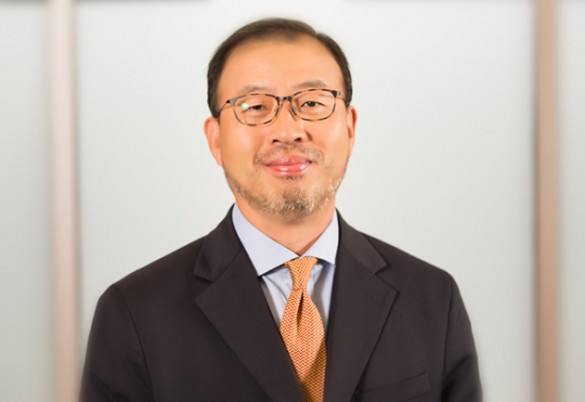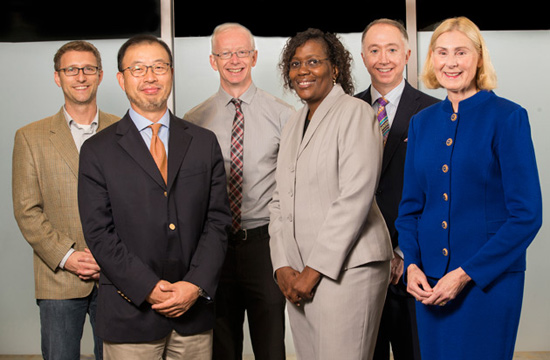
As Vanderbilt enters the Action phase of its strategic planning process, the Faculty Senate will play a key role in setting priorities, identifying resources and launching initiatives in support of the plan’s four main intersecting themes—enhancing the undergraduate living-learning experience; investing in trans-institutional programs; finding innovative solutions for health care problems; and transforming education models through technology and research—according to Paul Lim, chair of the Faculty Senate for 2014-15.
The senate comprises approximately 60 elected faculty members from across the university and medical center as well as the deans of Vanderbilt’s colleges and schools. The group has no legislative powers; rather, its duty is to investigate and give measured discussion to issues brought before it by the administration or concerns raised by fellow faculty. Still, the senate wields considerable influence in its ability to shine a light on a particular topic and advocate for or against it.
Lim, associate professor of the history of Christianity and of religious studies at Vanderbilt Divinity School and the Graduate Department of Religion, recently discussed where the senate will focus its attention this year, how Vanderbilt may distinguish itself in the higher education landscape, and why he relishes not being the “smartest guy in the room” when collaborating with his senate colleagues.
What’s at the top of the Faculty Senate’s agenda this year?
Lim: As we begin to implement the Academic Strategic Plan for students, staff and faculty, the senate will focus on ways to make the four pillars more comprehensive for other parts of the university—to complement what is happening with our undergraduate residential experience. One focus will be graduate education. Any faculty who teaches a big lecture class knows that we rely on teaching assistants to lead small groups, read papers, grade exams and so on. So what does it mean for a research-driven university to really have a synergy between undergraduate and graduate education? That’s one “G”—graduate education.
The second G is globalization’s impact and Vanderbilt’s initiatives to make the university a great place not only for American students, but for international students, scholars and staff as well. How do we do that in a very intentional and intensive way?
The third G is “golden obligation and opportunity.” With the recent opening of a dedicated space for the Project Safe Center and increased awareness of preventing power-based personal violence on campus, we’re trying to think about how we can use these—both as our obligation and as an opportunity—to start “walking the walk” in terms of caring for everyone in our community.
Can you elaborate on the last G—the “golden obligation and opportunity”?
Lim: More concretely, last year the senate passed a resolution on student safety and security. This year—during the fall semester—a sexual misconduct training module will be rolled out for all university and medical school faculty, and we will track their participation. It will be a dual delivery model—a team of trainers can make presentations in person, or faculty can participate in an online module. But we encourage faculty to attend an in-person training because of questions that will likely arise from the training.
For example, issues surrounding confidentiality. Due to Title IX reporting obligations, faculty cannot promise confidentiality if a student confides to them that they’ve been subjected to some type of sexual misconduct unless the faculty member’s role has been designated as a confidential resource—for example, if the faculty member is a physician or clergyman acting in that capacity. At the same time, we want to combat under-reporting. So the training will be both a symbolic and substantial measure for us to show and practice how we care for all of those among us.
What is the senate doing to address some of the possible root causes that undermine campus safety?
Lim: Vanderbilt is supposedly the “happiest campus” in the country, but what does that mean? It seems to me that students choose Vanderbilt because it’s a place where they can work hard and play hard. But when that balance goes off-kilter—for instance, if there’s a correlation between excessive drinking and power-based personal violence—what do we do about it? That’s the third measure of the senate’s plan—to create a joint platform with Vanderbilt Student Government to address the issue of binge drinking, not only at the undergraduate level, but also at the graduate level and throughout the tapestry of the university.
You’re faculty head of Crawford House at The Martha Rivers Ingram Commons. Is the idea of living and learning communities living up to its promise?
Lim: I think that’s still to be determined. At one level, the advent of The Ingram Commons has been a phenomenal success. Application numbers are still on the rise, and all quantitative and qualitative metrics indicate that we are letting in the smartest and most global class each year of the Commons’ existence. Furthermore, we have achieved an unprecedented level of equity and diversity, both socioeconomically and ethno-culturally. To be sure, Opportunity Vanderbilt has played a role in this. But combining that with the Commons, in my opinion, has been the winning formula.
However, I am a believer that the true effectiveness of the Commons or any first-year residential experience cannot simply be measured by the exit survey done by rising sophomores. And most importantly, how do you assess effectiveness and efficacy? I think we need to do a longitudinal study of the Commons’ and College Halls’ impact. It might be a bit soon, because the Commons has only been around for seven years. But I think it’s time for us to start gathering data from alumni. We’ve now had three classes of graduates who began their journeys in one of the 10 houses at The Ingram Commons. How do they feel about their undergraduate residential experience now?
Vanderbilt now has a national baseball championship under its belt. As our athletics prominence grows, how can we continue to nurture true student-athletes?
Lim: Vanderbilt has the highest academic standards among SEC institutions, but how do we maintain this while seeking greater prominence athletically? We give our student-athletes a scholarship education, but it’s not necessarily a free education. Are we making sure that they are not just picking up a diploma, but also picking up a different person, a transformed and educated individual? We expect that by right of all of our students, and we owe it as well to our student-athletes.
I think it’s another issue that we need to examine longitudinally. We’ve invited Vice Chancellor David Williams to give us additional reporting on our student-athletes, and the Executive Committee will continue to discuss what role the senate will play in this issue, and if it should play a role. I believe it should.
The senate convenes faculty from across the university and School of Medicine. What’s the best thing about this opportunity for trans-institutional collaboration?
Lim: I am genuinely impressed by how smart my colleagues are! As I get older, I care less and less about how I appear in the room and more about how the team looks. I’m simply floored by how brilliant some of their insights are. To be the chair of this group of people gives me great delight.

That begins with my vice chair, Rolanda Johnson—how thoughtful she is and deliberate in the way she frames her questions and makes comments. I’m grateful for the apprenticeship I received last year under immediate past chair Donald Brady and past vice chair Jeff Johnston. And I appreciate the talents and insights of chair-elect Richard Willis and vice chair-elect Ann Price and what they will mean for the continuity of the senate’s work going forward. It’s a delight to lead this group, to serve the university, and to make the Faculty Senate, I hope, a more visible participant in the myriad conversations taking place on campus.
A schedule of the Faculty Senate’s monthly meetings, as well as past meeting minutes, are available on its website.